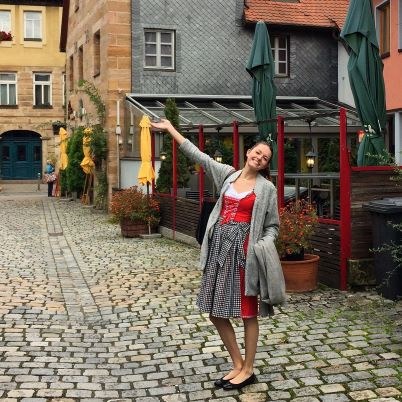Spotlights
Sarah Cullip

Sarah Cullip, '17
Major(s): English, German
Concentration: Secondary Education
Award: Fulbright ETA,
Germany, 2017-2018
- What prompted you to apply to the Fulbright program?
- My German professor at GVSU brought the Fulbright program to my attention and when I started to investigate the possibility, the Fellowships advisor further encouraged me to apply.
- What aspects of your university experience (classes, internships,
leadership positions, service commitments) were most useful to you
as a Fulbrighter?
- Well, certainly my German classes came in handy when I arrived in Germany for both social and logistical/bureaucratic reasons! Otherwise, the opportunities that I had during university to work with children in the classroom all proved to be very helpful in preparing me to teach abroad. By the time I went on my Fulbright grant, I had already spent hundreds of hours in front of the classroom, working with small groups or teaching in 1:1 settings. I also owe some of my preparedness to having been an athlete at my university. Balancing training and school taught me how to balance a full schedule and manage my time effectively.
- What was most unexpected or most challenging in your Fulbright
experience?
- I think bringing my community engagement project idea to fruition was the most challenging aspect of my Fulbright experience. In my application, I proposed something at the crosshairs of language (English) and sport. Upon arrival, you become preoccupied with finding suitable housing, settling in at your school and establishing friendships with fellow Fulbrighters - besides, the big question is: How/Where do I start?! Eventually, I got involved with a program called 'Integration through Sport' which seeks to facilitate social integration of young refugee and migrant children through the means of sports.
- What was most rewarding?
- The most rewarding part of my Fulbright grant period was probably the personal growth that I experienced. Imagine: you pack a bag for one year, fly abroad alone, navigate airports, train stations, buses and trams through unfamiliar cities in an unfamiliar country, doing everything in another language, until you arrive at an apartment that you found online months before but have never seen with a roommate you do not actually know. A few days later, you show up at a school ready to teach (and learn!) in a school system with a curriculum you also don't yet know much about. For me, stepping outside my comfort zone and embarking on this adventure demanded self-reliance, perseverance, willingness to make a lot of mistakes, and eventually an awful lot of personal growth. I am very thankful for that.
- How did you create connections with your host community beyond the
ETA or S/R experience?
- In addition to my role as an ETA, I also played basketball on a regional team, coached a basketball team of refugee/migrant girls who were new to the sport and new to Germany, studied Arabic and Swahili at a local university and tutored refugees in English and German at a temporary housing or reception unit.
- What are you doing now (in terms of study, work, hobbies -
whatever!)?
- After my Fulbright grant, I took a job teaching English at an international school in the Netherlands. I spent two amazing years there before deciding to pursue a Master of Science in Language Education at the University of Edinburgh, which I unfortunately had to complete online due to COVID-19. Since graduating in August 2021, I have moved to a new city (The Hague) in the Netherlands and taken an English teaching job at a Dutch secondary school. My Master's dissertation is currently undergoing the peer review process for potential publishing in the international academic journal Education Sciences. In my personal life, my (Dutch) boyfriend and I are in the process of buying a house and are very excited about settling down and starting a family here in The Hague. :)
- Did your Fulbright experience contribute in some way to what you
are doing/studying now?
- Definitely. I had a great experience as an ETA and have remained in education since.
- How did your Fulbright experience prepare you for your future
career?
- My Fulbright experience prepared me to teach in international, multicultural and multilingual settings. It also exposed me to a completely different school system and curriculum. You learn more about yourself as a teacher and about your own biases/assumptions when you experience something completely different. This allows for critical reflection.
- What advice do you have for those in the application process?
- I know the application process is long, the drafting of essays takes time away from your studies, you're not sure how the pandemic will affect Fulbright grants, your parents might not support you 100% in your decision to go abroad, and you might be scared.
- Keep going.
- It truly is an opportunity of a lifetime. I have lived or worked in Germany, Kenya, Tanzania, The Netherlands, and Scotland and all over the world the Fulbright program is very well known and highly regarded among the academic community. It will be hugely beneficial to have on your CV.
- Keep going.
- What would you want future Fulbrighters to know about the
in-country experience?
- There will be ups and downs, be patient. You will feel brave and free and proud at times, just as you will feel lonely and sad and frustrated at others. It is all part of the experience. Throw yourself into it and make the absolute most of it.
Interest Area(s)
English, German, Education
Share this spotlight
This spotlight was originally posted to the Center for Undergraduate Scholar Engagement website.
Return to the listing of spotlights.

